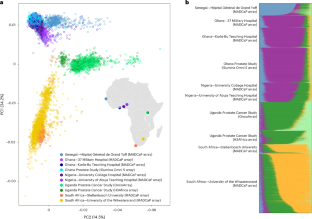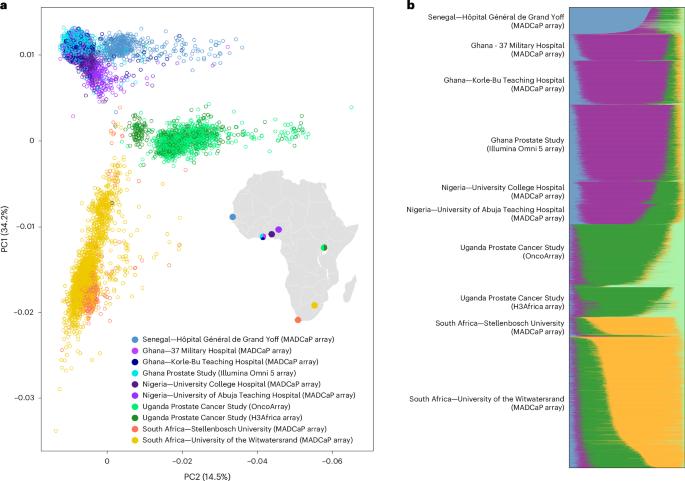Heterogeneous genetic architectures of prostate cancer susceptibility in sub-Saharan Africa
IF 31.7
1区 生物学
Q1 GENETICS & HEREDITY
引用次数: 0
Abstract
Men of African descent have the highest prostate cancer incidence and mortality rates, yet the genetic basis of prostate cancer in African men has been understudied. We used genomic data from 3,963 cases and 3,509 controls from Ghana, Nigeria, Senegal, South Africa and Uganda to infer ancestry-specific genetic architectures and fine-map disease associations. Fifteen independent associations at 8q24.21, 6q22.1 and 11q13.3 reached genome-wide significance, including four new associations. Intriguingly, multiple lead associations are private alleles, a pattern arising from recent mutations and the out-of-Africa bottleneck. These African-specific alleles contribute to haplotypes with odds ratios above 2.4. We found that the genetic architecture of prostate cancer differs across Africa, with effect size differences contributing more to this heterogeneity than allele frequency differences. Population genetic analyses reveal that African prostate cancer associations are largely governed by neutral evolution. Collectively, our findings emphasize the utility of conducting genetic studies that use diverse populations. Genome-wide association analyses of prostate cancer in men from sub-Saharan Africa identify population-specific risk variants and regional differences in effect sizes. Founder effects contribute to continental differences in the genetic architecture of prostate cancer.


撒哈拉以南非洲地区前列腺癌易感性的异质遗传结构
非洲裔男性的前列腺癌发病率和死亡率都是最高的,但对非洲男性前列腺癌的遗传基础却研究不足。我们利用来自加纳、尼日利亚、塞内加尔、南非和乌干达的 3,963 例病例和 3,509 例对照的基因组数据,推断了特定祖先的基因结构,并绘制了疾病相关的精细图谱。8q24.21、6q22.1和11q13.3的15个独立关联达到了全基因组意义,其中包括4个新关联。耐人寻味的是,多个主要关联是私有等位基因,这种模式产生于最近的突变和非洲以外的瓶颈。这些非洲特异性等位基因导致单倍型的几率比超过 2.4。我们发现,前列腺癌的遗传结构在非洲各地有所不同,效应大小差异比等位基因频率差异对这种异质性的影响更大。人群遗传分析表明,非洲前列腺癌的关联在很大程度上受中性进化的影响。总之,我们的研究结果强调了利用不同人群进行遗传研究的实用性。
本文章由计算机程序翻译,如有差异,请以英文原文为准。
求助全文
约1分钟内获得全文
求助全文
来源期刊

Nature genetics
生物-遗传学
CiteScore
43.00
自引率
2.60%
发文量
241
审稿时长
3 months
期刊介绍:
Nature Genetics publishes the very highest quality research in genetics. It encompasses genetic and functional genomic studies on human and plant traits and on other model organisms. Current emphasis is on the genetic basis for common and complex diseases and on the functional mechanism, architecture and evolution of gene networks, studied by experimental perturbation.
Integrative genetic topics comprise, but are not limited to:
-Genes in the pathology of human disease
-Molecular analysis of simple and complex genetic traits
-Cancer genetics
-Agricultural genomics
-Developmental genetics
-Regulatory variation in gene expression
-Strategies and technologies for extracting function from genomic data
-Pharmacological genomics
-Genome evolution
 求助内容:
求助内容: 应助结果提醒方式:
应助结果提醒方式:


